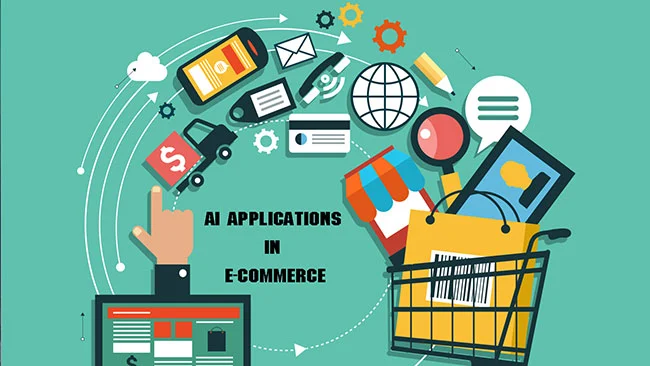Introduction:
According to Statista, the e-commerce market is projected to reach $3,226.00 billion in revenue in 2024, with a user penetration of around 36.6%. As in previous years, Amazon leads the list of the top business partnerships by market capitalization ($1.47 trillion). Other names include Alibaba, Shopify, Meituan, and Pinduoduo.
However, more e-commerce companies need to improve on the conventional user experience. Empowered by AI devices, online retailers are presenting mobile applications that enhance the performance of the entire value chain. Today, the forecasted market share of the AI-driven retail industry is $31 billion by 2028.

One can say with certainty that computerized reasoning is the new electricity for e-commerce mobile application development. It is reliable and efficient in processing informational indexes.
So, what are AI-powered applications?
AI-powered mobile applications use Machine Learning, Artificial intelligence, Computer Vision, and Normal Language Processing technologies to execute complex activities. By applying the power of Artificial intelligence to diverse use cases, they provide superior arrangements and ensure a better end-user experience.
ML models connect collected information and make predictions based on it. Once an AI shopping application has been trained on user preferences and suggested items, it recommends products and forecasts demands.
These most famous e-commerce applications have implemented AI technology to support their businesses: Amazon, IKEA, Wayfair, Alibaba, Justuno, Sephora, and Rewind.
For what reason Do E-Commerce Businesses Need AI-Powered Mobile Applications?
The reasons are different, and their number exceeds those showcased below. Yet, we’ll zero in on the main 5 reasons your e-commerce business needs to fabricate applications with AI.
People purchase online: In 2024, there will be 2.64 billion online customers, which is 33% of the world’s complete populace. Online sales have become so easy because they’re simple and fast. With more people going to the Internet to purchase things, businesses need to send off e-commerce application development to remain ahead of the game. However, it is as of now not enough to create an e-commerce application. It ought to be an AI application in e-commerce.
Worldwide reach: Shopping application development permits businesses to erase geographical boundaries and have a worldwide presence. Previously, businesses needed to open actual shops, deal with neighborhood regulations, hire more employees, and have successful advertising campaigns to enter the market outside their geography. Presently, it’s enough to create and send off an application to reach a worldwide audience.
Convenience: People search for convenience in everything in the present occupied world, especially when shopping. Those who offer their services and items in AI-driven mobile applications provide their target audience with the convenience they’re searching for. Users can browse and purchase what they need by means of an application, regardless of time or area.
Personalization: The utilization of Man-made reasoning in e-commerce permits customers to find services or merchandise tailored to their needs rapidly. After utilizing customer examination and information, AI-driven applications deliver personalized experiences: They recommend items based on order history and send limits and advancements relevant to customer interests. After a few successful purchases, personalization becomes the feature that makes customers come back for more.
Cost-efficiency: AI technology is more savvy than conventional physical stores. In other words, you don’t need to pay for staff salaries, utilities, or rent since the business is run on the server side. Of course, assuming you decide to create a mobile e-commerce application with AI technology, you’ll need to make an investment that equals tens of thousands of dollars. However, this investment generally pays off eventually.
Step-by-step instructions to Assemble an Application with AI for E-Commerce:
Every e-commerce business is unique, and that means that approaches to building an e-commerce mobile application with AI are diverse. The steps we’ll introduce below are general approaches that ought to be adjusted to your needs.
Step 1: Begin with an Application Idea
Step 2: Articulate Business Objectives
Step 3: Choose the Stages
Step 4: Make a Rundown of Features
Step 5: Thoroughly consider UI and UX
Step 6: Hire the Right Developers
Step 7: Installed a QA Engineer before Sending off an Application
Step 8: Advancement and Send off
Step 9: Analyze Application Performance
What does it cost to assemble an AI-powered e-commerce Application?
On average, the budget for mobile application development for e-commerce ranges from $40,000 to $80,000. Integrating AI-based instruments into it will cost more and depend on different elements. The main one is the complexity and advancedness of your AI devices.
The best method for receiving a more detailed or precise estimate is to counsel a development team with experience building AI-powered applications for this industry.
FAQ:
Might AI, at any point, develop a mobile application?
It will not get you across the end goal with a brief, but AI application builders give you a decent speed lift to get there. You can deploy applications faster or use the extra time to chip away at the more significant features, which will improve the nature of your applications over time.
Is e-commerce an AI?
AI is used in e-commerce marketing to help e-commerce businesses understand their customers and identify new buying behaviours and trends. It likewise permits companies to create more targeted advertisements, marketing campaigns, and offers.






